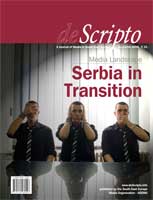

Keywords: The new civil Code; right to own image; rights of personalities.
The new Civil Code adopted expressly by the romanian legislature govern the right to their own image, by including in the broader category of personality rights, but giving the relative autonomy by separate regulations. This right allows the holder to prohibit or prevent such reproduction, in any manner that physical appearance or voice, or, where appropriate, the use of such reproductions, deducted from the reason that the text, in certain circumstances, such a ban may become incident, including how the image is captured. However, this right is not likely limited. To determine the status, we left the legal text devoted by the provisions of the new Civil Code, relating to the jurisprudence of national courts and the European Court of Human Rights while exploiting many facts or interpretations identified in legal practice in France, Germany, United States and the Canadian province of Québec.
More...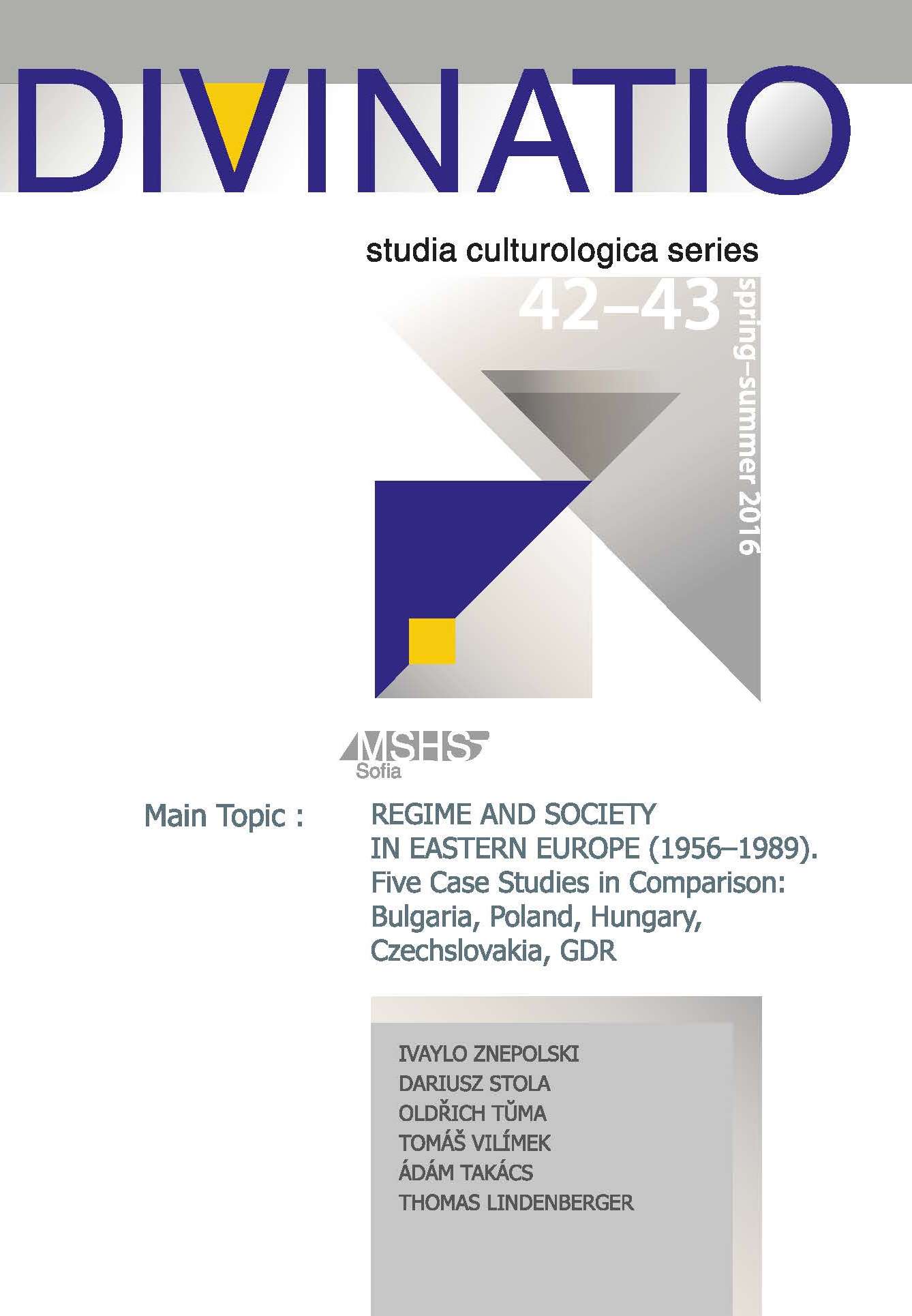
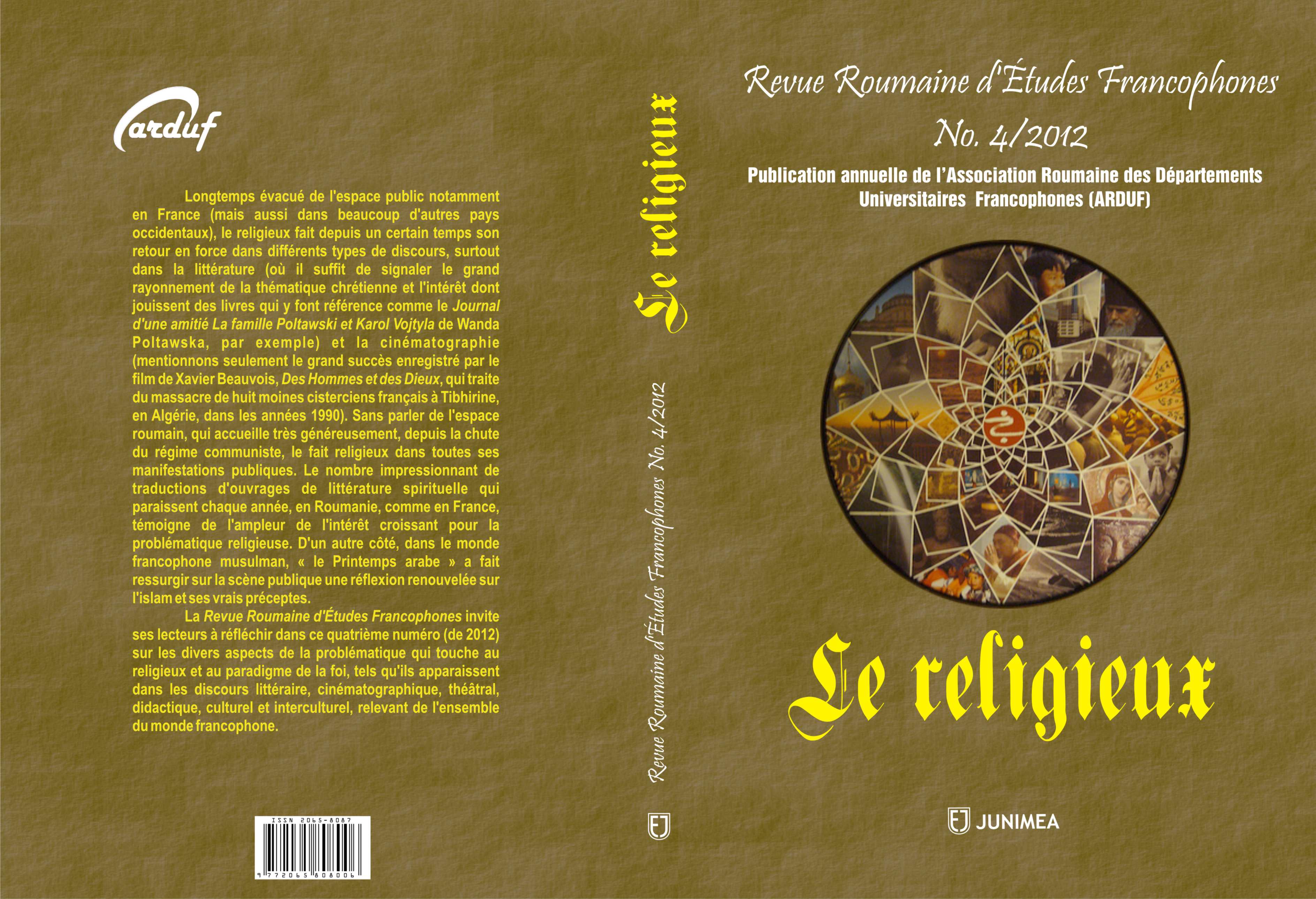
Keywords: Judas; belgian literature; contemporary literature; christian myth;
Belgian French-language literary works in which the character of Judas appears, for the most part plays and novellas, merit some attention. They are numerous and diverse, and the literary mastery of some of the authors, such as Maurice Maeterlinck and Alexis Curvers, makes them worth taking the time to read them. The multiplicity of possible interpretations makes it difficult, of course, to offer just one, unique portrayal of the biblical traitor as well as to measure how such portrayals are received in Francophone Belgium. Certain minor playwrights have preferred to remain faithful to the Judas found in the medieval Passions, Ghelderode projects his own misogyny and rejection of bourgeois materialism onto the accursed apostle, while Juan d’Oultremont offers a most disorienting reading. And the list goes on. Perhaps this very lack of “coherence” could, ultimately, be considered to constitute the defining characteristic of this corpus.
More...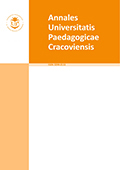

Keywords: transnationalism; The Kite Runner; The Namesake; ambivalence; identity
In multicultural societies which are the effects of the globalising world, concepts like identity, nationality, personality, and heritage are becoming ever more fluid. While individuals who come into contact with different cultures may experience identity crises, people who never leave their culture also encounter similar difficulties because of technology and media. As a result, there have emerged transnational characters who have interacted with two or more countries and cultures. These characters are divided into two categories as immigrants who leave their motherland, and second generation who are born into the host country. On one hand, immigrants move along with their cultures and lifestyles to the host country. Yet, there is always a dilemma for such characters. Should they choose their native culture or adapt to the host country and live like its people? Khaled Hosseini’s The Kite Runner and Jhumpa Lahiri’s The Namesake feature two protagonists who could not make peace with their home cultures. They both live in the US and try to adapt to the host country’s circumstances by neglecting their countries of origin. In this article, I will analyse their denial of their country of origin and their struggle to turn themselves into Americans. The conclusion will clarify whether the trauma they experience as a result of this denial restores balance to their sense of authentic self or builds another imbalance in their identities.
More...
Keywords: identity; Chicano; code-switching; Cisneros
The aim of this essay is to discuss the way in which Spanish words and phrases are deliberately combined with the English ones in the Chicano/a literature to reflect the ethnic identity of the speakers of Chicano English. This is done through the analysis of three short stories written by Sandra Cisneros, with particular stress laid on the situations in which code-switching is employed.
More...
Keywords: Philip K. Dick; schizophrenia; mental illness; Heraclitus; aliens; Mars
The paper discusses the situation of mentally incapacitated characters of Philip K. Dick’s 1964 novel The Martian Time Slip, in which the writer uses the possibilities of Martian setting to construct a dramatic narrative that features two people whose comprehension of the surrounding reality differs from that of the ‘normal’ characters. The novel focuses on the social incongruity of those who are considered mentally ill, and their struggle to overcome society’s conformity and ignorance, when it comes to accepting such people in society. The two focal characters are Manfred Steiner and Jack Bohlen; the former is an autistic child and the latter suffers from a latent form of schizophrenia. Both of them struggle to survive in the grim and oppressive environment of Martian colonies. The work is also an exploration of a subject that Dick returned to very often: the relationship between subjective and objective worlds. Dick shapes his view on Heraclitean formulation of the universe as consisting of private idios cosmos and the collective koinos cosmos, twin spheres determining our existential place in the world. In Dick’s understanding of Heraclitus the two cannot be easily distinguished.
More...
Keywords: the aesthetic principle; thematic structure; lacrimosity; eternal loss
The article argues that Hill’s craftsmanship, labelled as “thorny,” does not exclude the less erudite readers, however poorly versed in the poet’s “cryptic allusions.” My own close reading of Lachrimae and Tenebrae is a personal account of how I attempted to unveil Hill’s relation to God. As well as identifying the stages of “lacrimosity” of self-seeking martyrdom and self-indulgent mourning, which culminate in the anguish of absence the essay offers an insight into the aesthetic and the moral nature of the poet’s search for the Absolute. According to Geoffrey Hill, poetic inspiration can lead a way to spiritual rebirth and moral regeneration, while self-knowledge brings the artist close to the Divine.
More...
Keywords: City-space; Class divisions; Lefebvre; Thrity Umrigar
Thrity Umrigar´s The Space Between Us (2005) can be understood as an exploration of class divisions and their distribution in the city-space of Mumbai. The work delves into intersections of gender and class through the relationship between upper-middle class Sera and her lower class servant Bhima, a character inspired by an actual servant Umrigar had as a child. The author recalls how the women in the family, mother, aunts and servant, shared the house chores in a sort of female community which was interrupted, however, by what the author termed “the elephant in the room”. This elephant was class which worked as a ritualized “space” that prevents a real encounter between Sera and Bhima. Inspired by Henri Lefebvre´s conception of space as active agent and passive object together with Edward Soja´s notion of spatial justice, my aim in this paper is to study that “elephant in the room”, that is, I intend to read Umrigar´s portrayal of class divisions from a spatial perspective.
More...
Keywords: detective fiction; Barbara Wilson; queer representation; queer identity; queer family
Although published in the heyday of a consolidated tradition of lesbian detective novels, Barbara Wilson’s Gaudí Afternoon (1990) moves ahead of it as it reworks the lesbian figure as cultural sign—a stable set of lesbian stereotypes which, despite their problematic otherness within heteronormative identity, have become static and politically correct within the lesbian field of vision. Parodically echoing Dorothy Sayer’s Gaudy Night (1935), Wilson’s novel stages a disquieting dislocation of the genre’s strongly encoded investment in heterosexual gender politics—and its misogynist, biology-centered politics of representation—which eventually runs into a serious recasting of genre roles, figures, meanings and narrative gestures overflowing either detective and lesbian patterns. Gaudí Afternoon thus provides clear instances of this joint genre-gender transgression to the point of anticipating what Gill Plain has pointed out as “shifting paradigms,” or cutting edge crime narratives moving into a border zone of indeterminacy which mutates into queer—open, dynamic, cross-border, excessive—apprehensions of law, crime and criminality, society and its interpellated state institutions. Thus queered, lesbian detective fiction mutates into an active signifier which is here envisaged from Butler’s performative theory of citational practices and “corporeal styles of gender.” In this light, Gaudí Afternoon not only re-appropriates standard gender conventions and stock corporeal styles by positing trans-gender and trans-genre proposals within symbolic spaces and political agendas. Above anything else, it invites imaginary spaces and formulae intent on reconciling queer agency and the parodic citation of two of its most paradigmatic patriarchal structures, family and maternity.
More...
Keywords: Roman Catholicism; Protestantism; Victorian; femininity; masculinity; the Other
When studying Victorian texts dealing with Roman Catholicism or Anglo-Catholicism, one can observe very often that they are structured around the cultural dichotomy: “masculine” Protestantism versus “feminine” Catholicism. The feminization of Catholicism is particularly striking in the portraits of Catholic men, ranging from The Punch cartoons, which portrayed Anglo-Catholic priests mincing in their new vestments in front of the mirrors, to the references to emasculated men in the works of such authors as George Borrow, John Ruskin and most notably Charles Kingsley. This kind of portrayal can be explained by several factors: a long-standing legal discrimination of Catholics, placing Catholic men effectively on a par with women; the contrast between “emotional” Catholicism, relying on the sensual appeal of liturgy versus the “rational” Protestantism based on the Word of God; finally, abjection as defined by Julia Kristeva, casting the Catholic in the role of both repulsive and attractive feminine Other.
More...
Keywords: Cromwell; English revolution; tyranny; politics; Locke; Hobbes; Milton
The figure of Oliver Cromwell has long been associated with tyranny or despotism. Although it is hard not to notice Cromwell’s atrocities and ruthlessness in his military actions, the attribution of tyranny to his entire rule might seem at least unjustifiable. Political theorists contemporary with Cromwell, such as John Locke, Thomas Hobbes, or John Milton commented on, disputed and argued about the origins of authority and tyranny during and after the Interregnum. In his Leviathan Hobbes implies that tyranny actually equals sovereignty and has to be taken for granted. The major point in John Locke’s Two Treatises of Government and the chapter “Of Tyranny” is that a tyrant makes his will a rule and exercises his power beyond right for his own private benefit neglecting the advantage of his subjects. In The Tenure of Kings and Magistrates Milton shares Locke’s views and reiterates that a tyrant reigns only for himself. The present article takes a look at Cromwell’s Protectorate and attempts at highlighting those episodes of his political career in which he was most commonly accused of being a tyrant. The principal aim of the article is to scrutinise Cromwell’s actions and view them against the background of the 17th century political theories which strived to define tyranny and its roots.
More...
Keywords: R.S. Thomas; poetry; painting; ekphrasis; female
Every critic commenting on the work of the Welsh priest-poet Ronald Stuart Thomas (1913-2000) is immediately confronted with the problem of overwhelming abundance – whatever the theme, whether the poet wrestles with the thorny question of God’s alleged disappearance from the horizon of human thought, debunks the myth of Welsh peasants living serenely in tune with nature, or comments on the unsettling implications of scientific investigations for religion, the sheer scope of material compels one to carve out a small cluster of poems for analysis. This is also true about one relatively little known group of his oeuvre – his ekphrastic poems. That is why, for reasons of time and space, this essay focuses on Thomas’s poems on paintings by the French artist Edgar Degas. It tries to examine the strategies employed by the Welsh poet in the hope of negotiating the distance between the sphere of visual art and its representation in language. The article also addresses the question of why Thomas is so persistent in trying to tease out from the paintings various implications which transcend the realm of pure description.
More...
Keywords: intertextuality; postcolonial theory; feminism; ethics
The present discussion of John Maxwell Coetzee’s 1986 novel Foe, which explicitly alludes to Daniel Defoe’s well-known novel Robinson Crusoe, focuses on Coetzee’s specific rewriting of the intertext. The elements retained, altered and introduced suggest theoretical perspectives which may be employed to determine the significance of the transformations. While Foe has been often investigated from the perspectives informed by feminist and postcolonial discourses, the aim of this article is to address crucial aspects of the text left unexplored by these readings. Indisputably, Coetzee’s construction of the character of Cruso invokes postcolonial theory, as this contented castaway undermines the myth of empire and the entire colonialist enterprise promoted in Defoe’s canonical text. In turn, the introduction of a female narrator and author, Susan Barton, explicitly questions the absence of women in Robinson Crusoe as well as eighteenth-century sexual politics. However, Coetzee’s transformation of Defoe’s Friday into the mute slave in Foe defies a facile explanation and has been seen as promoting rather than countering the silencing of the subaltern. Adopting an ethical perspective allows to view Friday’s lack of voice as a consequence of Barton’s refusal (mirroring Coetzee’s) to speak for him. Ethics emerges as the only force capable of restraining the self’s drive for power over the other inherent in acts of voice appropriation.
More...
Keywords: Mary Stuart; Ssottish Catholics; Scottish Reformation; Scottish Protestants; Scottish episcopate; Scottish nobility
Mary Stuart’s real importance, in the eyes of Europe and, soon, in her own, lay in the fact, not so much that she was queen of Scotland, but that by the Catholics she was thought to be the legitimate heiress of England. Soon after her husband, Francis II, died Mary received the proposal of the Scottish Catholics to return to Scotland, bring it back to Catholicism and with the help of Scottish and English Catholics, and perhaps Spain and the Pope, depose Elizabeth. However, the loyalty and the strength of the Catholic nobles in Scotland were very questionable, and most of the leaders of the “Catholic interest” were characterized not by religious zeal but by a general conservatism and aristocratic lineage. Nothing better could be said about the Scottish Episcopate, as of the eleven bishops who were in office in the early 1560's only two could be regarded as conscientious papalists and not fewer than eight were considered by the Holy See unfit to receive an invitation to the council of Trent. Realising the weakness of this party, Mary decided to decline their proposal and accepted the invitation of the Scottish Protestants to return to Scotland and rule with their help.
More...
The Conference communication is a report onthe international historical conference “Food as medicine: historical perspectives”, that was held on October 9th–10th, 2015 in Dublin, Ireland. The conference was co-organized by Pedagogical University of Cracow, St Patrick’s College, Dublin City University, The Edward Worth Library, Dublin, The Gilbert Library, Dublin,
More...
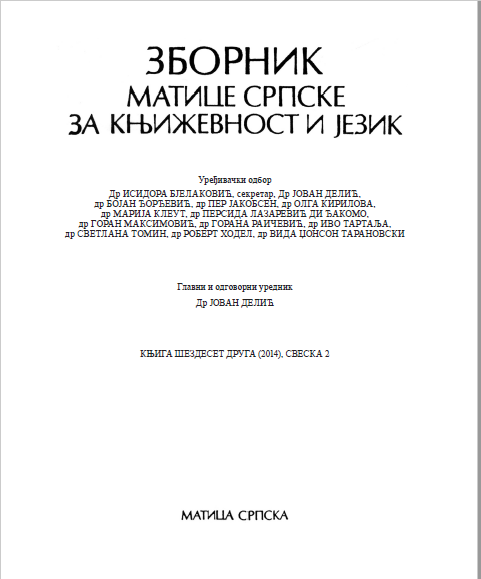
Keywords: Radmila Šalabalić; Petronius; Translation studies;
When in 1976 the new Serbian translation of Petronius’ Satyricon by Radmila Šalabalić (1927-2011) came to light, it marked a turning point in the practices of our translators of classical authors. By taking an entirely new stylistic direction, basically oriented to the works and authors of the satirical and realistic genres of classical literature, Prof. Šalabalić made a decisive impact on the younger generation of translators. The distinctive feature of this new poetics is primarily associated with the entirely original and innovative use of the Serbian language and its different literary and colloquial variants and local idioms as the most powerful stylistic device for conveying parodistic and humorous potential of the original text. Regarding the narrative of the Latin prototype as historically conditioned, deeply idiosyncratic and thus ‘alienated’ from the contemporary reader, i.e. incomprehensible in many ways (different civilization, different habits, different national and historical mentalities etc.), Radmila Šalabalić succeeds in applying the Serbian linguistic element of the translation as an effective means of text ‘de-alienation’, thus bringing the reader closer to the realistic, satirical and parodistic aspects of the meaning inherent in the original.
More...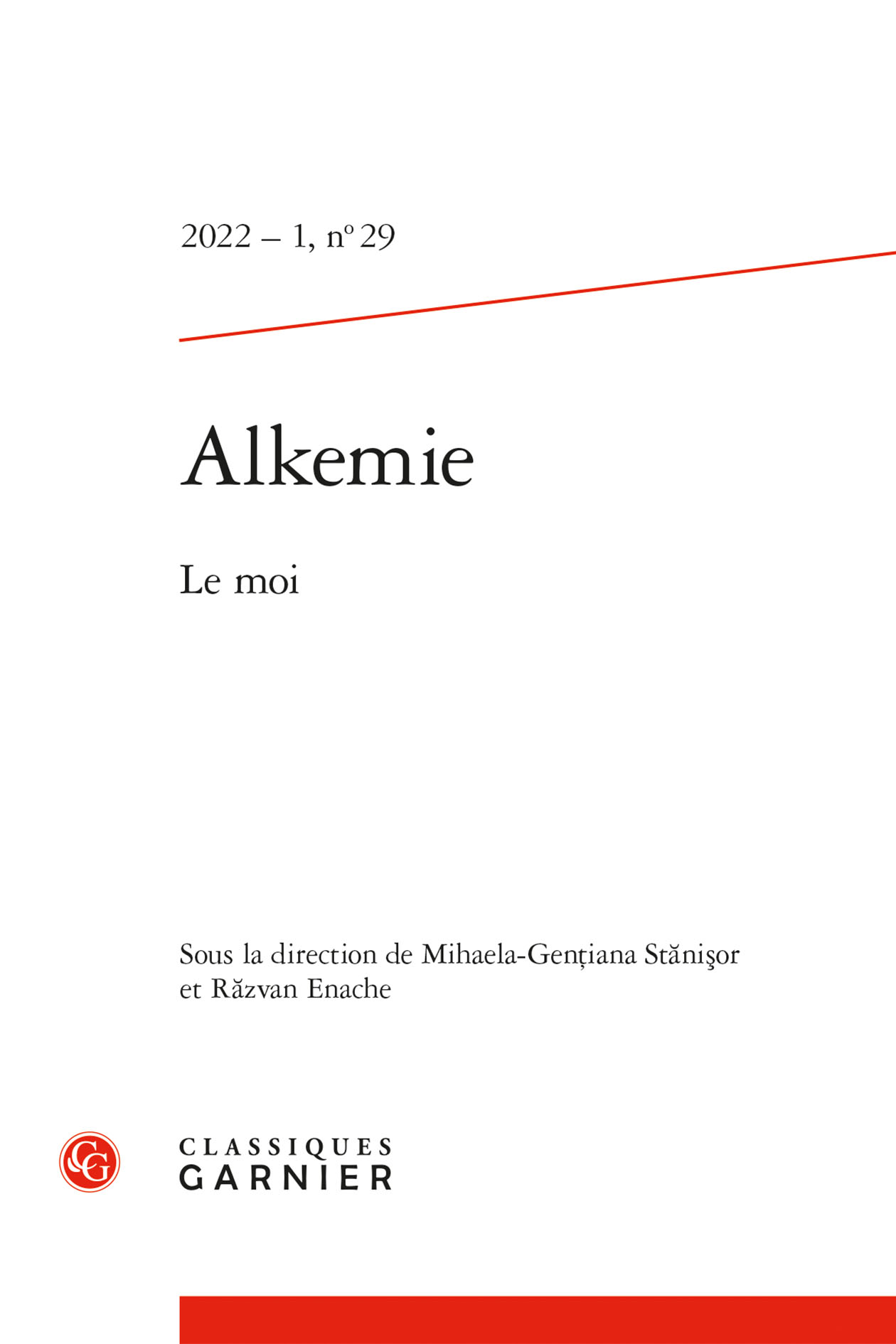
Keywords: cultural identity; self-identity; community; multiculturalism; authenticity;
In an age in which identity claims are more present than ever, the idea of individuality seems – paradoxically – threatened, as if the growing importance of the “we” inescapably entailed the destruction of the “I”. However, should we really have to choose between an “authentic” singularity and a “encompassing” collectivity? The philosophy of multiculturalism may provide an interesting alternative to such an ongoing battle between the individual and its community.
More...